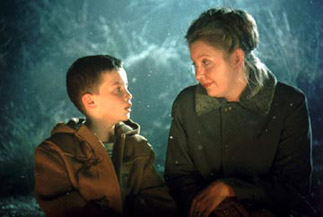Director's Spotlight
Danny Boyle
By Joshua Pasch
February 18, 2010
In the last Director's Spotlight column we took a look at Doug Liman, a director who had a strong independent voice before he turned his attention to making mostly top-notch genre fare. This week, we'll examine someone who is fiercely independent and seems like he's staying that way; he is a director who, with little exception, has made some of the finest independent films of the 2000s.
After the well-reviewed but little seen dark comedy Shallow Grave, Danny Boyle loudly announced his entrance into the indie film scene in a big way with his mid-'90s insight into London's drug scene with Trainspotting. After sticking with Ewan McGregor again for his next film, Boyle went with a post-Titanic DiCaprio for his Thailand-set paradise lost drama, The Beach – an admitted guilty pleasure for me, though generally ill-received by most. Boyle found more commercial and unexpected success in a big way in 2002 when he re-teamed with Beach writer Alex Garland for the low-budget zombie-thriller 28 Days Later. In Boyle's take on the genre, the undead exhibit a change of pace, turning from passive, walking zombies into sprinting, convulsing terrors. Boyle can be given credit for revitalizing a previously dormant genre, having preceded Zack Snyder's Dawn of the Dead remake, Romero's return to the genre with Land of the Dead, and the clever rom-com-zomb flicks Shaun of the Dead and Zombieland.
Boyle's early successes across diverse genres made him a tough director to peg. His films spanned all variations of tone, theme, and overall style. He built a devout following, but a small one. His movies proved immensely popular amongst distinct groups, but none became true blockbusters. Let's shine the director's spotlight on his last three films – all of which serve to accentuate his unique and disparate choices.
Millions
In 2005, against all odds, Boyle found himself traversing new terrain – the family film. Knowing what we do about Boyle, this was never going to be your typical, put-your-parents-to-sleep-and-please-the-kids family flick. In Millions, he explores themes of lost innocence when Damien, a benevolent seven-year-old, finds a suitcase literally filled to the brim with money. The child believes the cash is a gift from the heavens themselves and immediately starts to look for ways to give it to those more needy than he. Meanwhile, he must weigh his desires for good with those of his brother's insistence that they invest it in real estate. The movie is filled with whimsical and fantastical motifs, including Damien's many interactions with the real-life likes of Saint Joseph, Peter, and Nicholas. The charm of Millions is that it manages to freshly capture the pure innocence of youth, while also grappling with the moral decisions that make life so difficult. Think of it as the antithesis to WB's 7th Heaven – a morality tale in which nothing is black and white.
The budget for Millions is probably lower than the amount found in Damien's duffle bag; the movie features an incredibly low profile cast and limited effects work. With movies that have this low of a pedigree it's always hard to peg down where the line of success lies financially. Millions closed its domestic run with a too-low-to-be-truly-successful $6.5 million and just shy of $12 million worldwide. Even still, it's quite likely Fox Searchlight was satisfied if not excited with the platform release, which debuted in five theaters and never made its way into more than 340.
Millions remains one of Boyle's most under-seen and underappreciated films – it just made BOP's 2006 Top Ten Best Overlooked Films at #8 in the Calvin Awards. While many of Boyle's movies haven't broken out into true mainstream success, they at least accrue a passionate legion of followers. Such is not the case for Millions, but does hold true with his follow-up feature.
Continued:
1
2
3
4
|
|
|
|




